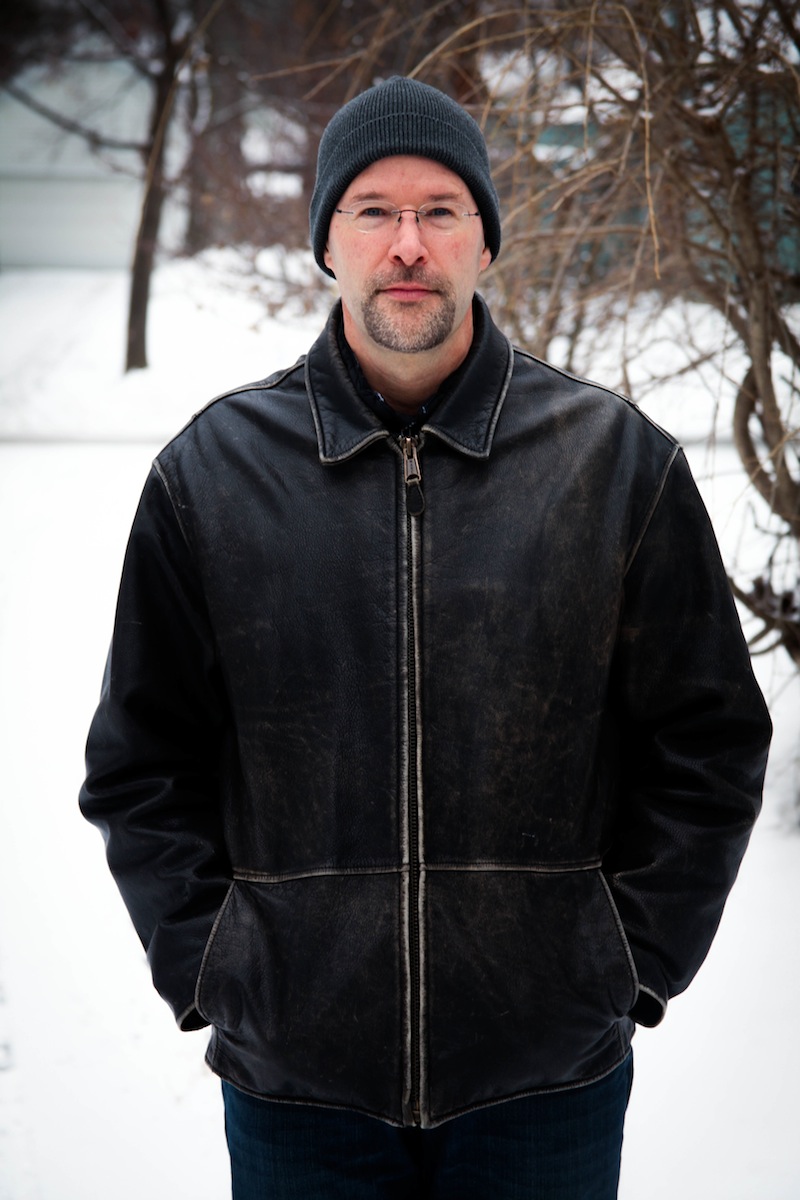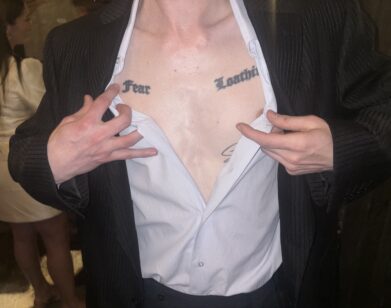Other People’s Love Stories

ABOVE: DANIEL JONES. PHOTO BY PHOEBE JONES
Daniel Jones didn’t set out to be the gatekeeper of love. Yet as the editor of The New York Times‘ Modern Love column, he’s spent the past nine years immersed in other people’s passion. In his new book, Love Illuminated (William Morrow), Jones culls the 50,000 stories that have crossed his desk, investigating various aspects of relationships, from pursuit to vulnerability to loyalty. As a sort of latter-day male Carrie Bradshaw, the down-to-earth Jones claims cultivating the column has been less about mastering knowledge than marinating in life’s greatest mystery.
Revealing his own love story, Jones met his wife of 22 years, novelist Cathi Hanauer, on an improbable day in grad school when she came to check out the Arizona MFA program and he was assigned to guide her (despite her request for a female student). They bonded, exchanged letters and stories, and even discovered a book Jones’ father had authored had long been shelved in his future wife’s home. After 18 months, she was the one who proposed, though he swears he was about to. The couple now lives and works in Northampton, Massachusetts with their two teenage kids. Jones claims he’s not traditionally romantic, despite “reading other people’s love stories for a living.”
We spoke with Jones about how love, so central to us all, can still be so hard to define.
SARAH HERRINGTON: How did a self-admitted slacker and former ski instructor end up as the Times Modern Love editor?
DANIEL JONES: My wife edited an anthology called Bitch in the House, a collection of essays written by women frustrated with the promise of feminism. That anthology became Times best seller and allowed me to do a follow up from the husband’s perspective, The Bastard on the Couch. Editor of the Sunday Styles section, Trip Gabriel, loved personal essays about relationship complexities. We went to New York, met with him, and my wife and I launched the Modern Love column together. But before the first essay even ran, Cathi decided not to go forward. It wasn’t a job for two. I took it on myself.
HERRINGTON: I love that this relationship column was basically born out of your own. Do work and love mesh together often for you?
JONES: Well, it’s not good for us to be in the same room when we’re working. [laughs] But we share and connect over writing. Cathi also opened my eyes to what an editor could do with great stories from newer or unknown authors, which many pieces in the column turned out to be.
HERRINGTON: There have been 465 essays so far, 37 of which have spawned books. With all that material, how were you able to pick just 10 aspects of love to organize the book?
JONES: I asked myself: What are the most common questions that define the material I work with? So much of love is unanswerable. I realized those questions could structure the book, which mirrors the arc of most relationships. I begin with “Pursuit” and end with “Wisdom.” That’s ironically the shortest chapter.
HERRINGTON: Modern Love has become hugely popular, with well-known authors such as Ayelet Waldman contributing alongside newer voice; actress Maria Bello recently came out in a piece. The column has a loyal following of 1.5 million readers and 49,000 Facebook fans. Does the column also inspire you?
JONES: Yes, I’m often stunned and humbled by the stories. As a cautious and shy person, I’m in awe of those who really walk out on an emotional high wire and are vulnerable. Yet the only way to have a real partnership is to expose yourself to the possibility of devastating loss. We keep trying to alter this, to hide behind smartphones and laptops and arrange relationships that don’t require risk. But love needs us to let down our guard. You have to embrace your inner sucker.
HERRINGTON: That reminds me of your phrase “Soul Mate in a Box” and the idea that technology has shifted how we connect. You talk about intimacy that exists solely online, via text and Skype. How has the computer age changed romance?
JONES: We’re always looking for an easier, deeper way to connect. In cyberspace, shy people can be bold. We can hide our perceived flaws and speak our minds. We don’t have to think about the relationship as seriously, because we often doubt we’ll meet in person. This all allows us to fall deeper than ever. The problem comes in trying to then meet and have the “real you” live up to this persona you’ve created.
I kept seeing these connections flame out in essays. I wondered why and looked for patterns. People write with a different personality than they speak, often because they are quiet in real life. With online profiles and texting, there are two sides to us we can’t always breach. Or they’re less comfortable dealing with someone face to face and are more comfortable with a gadget. They’re used to getting their fix on the phone.
When two people pour their hearts out online and then have to turn away and make actual eye contact, it doesn’t always work. Your emotional bond can get way ahead of your relationship. Sometimes there’s no catching up. It seems as quickly as possible you need to get all different aspects of yourself involved. There are no shortcuts.
HERRINGTON: Does destiny fit into online dating?
JONES: Online dating sites have made matchmaking more mathematical. You enter your parameters and there’s some algorithm that sets you up with compatible partners. Millions of singles place trust in that now. Then there’s speed dating, where you get quickly farmed through.
These ways of meeting make many feel like love is less magical. It’s made fate more important, ironically. People seize onto coincidences more than ever. Coincidences that line up can mean, “We’re meant for each other.” Then it becomes a self-fulfilling prophecy: “We have to work this out because we’re meant for each other.” So instead of science and math replacing those intangibles, they are more important.
HERRINGTON: No matter how technology tries to make love clean-cut, it’s still messy. Do you notice a lot of contributors find chronicling their romantic traumas helps finally sort them out?
JONES: A lot of people can’t figure out what they think until they write. The process helps them come to understanding. That still doesn’t mean you’re in control. As an editor I try to figure out where in an essay someone is holding back. The best material comes from pressing someone to think about why they feel a certain way. Talking with writers I’m like Columbo, a detective who asks questions that might seem stupid, but disarm. Just being a curious person who wants to understand can pull out what’s missing.
HERRINGTON: You’re also the author of the novel After Lucy and two essay anthologies. What did writing Love Illuminated illuminate for you?
JONES: I’d been editing the column for nine years and was always being asked what I knew about love. It’s the same question someone asks themselves when they sit down to write an essay. I wrote the book to figure it out.
Marinating in so many people’s stories you get a clear sense of who’s happy in life. It has to do with opening your heart again after loss and going into relationships without preconceptions. Those are the people who seem to have happy lives. There’s something nice about that equation. It’s a rewards system for the curious and open hearted.
LOVE ILLUMINATED IS OUT TODAY. DAN JONES WILL APPEAR AT EVENTS THROUGHOUT FEBRUARY INCLUDING AT THE UPPER WEST SIDE BARNES AND NOBLE THIS THURSDAY, FEBRUARY 6, AND THE JCC IN MANHATTAN NEXT THURSDAY, FEBRUARY 13.






